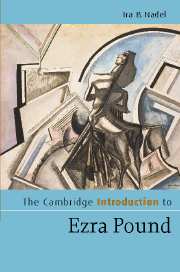Chapter 4 - Critical reception
Published online by Cambridge University Press: 05 June 2012
Summary
Yeats used to say I was trying to provide a portable substitute for the British Museum.
Ezra Pound, 1934Readers, critics and the public did not know what to make of Pound. His politics were extreme, his criticism abrasive and his poetry complex. Unlike T. S. Eliot or Joyce, he never had a “bestseller” – a work of popular appeal or commercial success. The Waste Land and Ulysses were internationally recognized. Pound never had a poem so widely accepted, although his presence was indisputable, as Carl Sandburg explained: “All talk on modern poetry, by people who know, ends with dragging in Ezra Pound somewhere. He may be named only to be cursed as wanton and mocker, poseur, trifler and vagrant. Or he may be classed as filling a niche today like that of Keats in a preceding epoch. The point is, he will be mentioned” (CRH 112).
The only text of Pound's that seemed to obtain wide recognition was his two line, haiku-like, “In a Station of the Metro.” When he did receive attention, it was more for controversy rather than praise. The Bollingen Prize of 1949, for example, led to tremendous battles in the press and in the US Congress over awarding a prize from the Library of Congress to a traitor and anti-Semite. When he returned to Italy following his release in 1958, his photograph stirred new resentments: with arm raised, he gave the Fascist salute and told reporters that “All America is an insane asylum” (SCh 848).
- Type
- Chapter
- Information
- The Cambridge Introduction to Ezra Pound , pp. 106 - 129Publisher: Cambridge University PressPrint publication year: 2007

